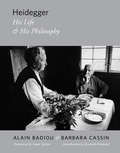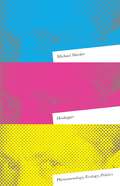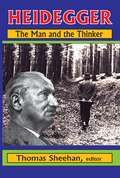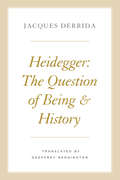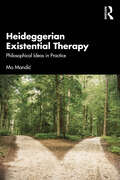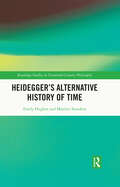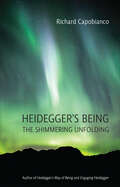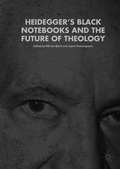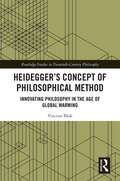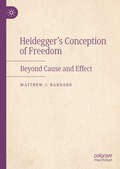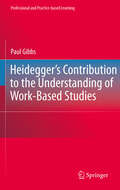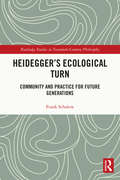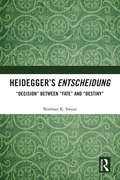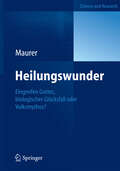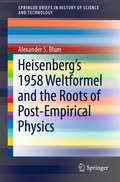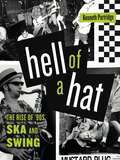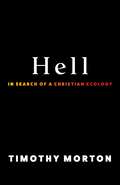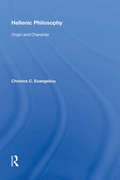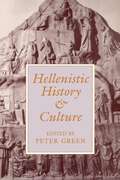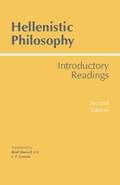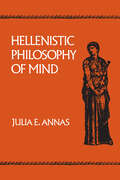- Table View
- List View
Heidegger: His Life and His Philosophy (Insurrections: Critical Studies in Religion, Politics, and Culture)
by Barbara Cassin Alain BadiouMartin Heidegger was an ordinary Nazi and a loyal member of the provincial petty bourgeoisie. He was also a seminal thinker of the Continental tradition and one of the twentieth century's most important philosophers. How are we to make sense of this dual life? Should we factor Heidegger's domestic and political associations into our understanding of his thought, or should we treat his intellectual work independently of his abhorrent politics? How does any thinker reconcile the mundane with the ideal or the pursuit of philosophical inquiry with the demands of civic engagement?In Heidegger, Alain Badiou and Barbara Cassin immerse themselves in the philosopher's correspondence with his wife Elfride to answer these questions as they relate to Heidegger and all thinkers vulnerable to the politics of their times. They focus on Heidegger's tormented relationship with his wife, with Hannah Arendt, and with numerous other women, bringing an unusual level of intimacy to his personal and intellectual worlds.
Heidegger: Phenomenology, Ecology, Politics
by Michael MarderUnderstanding the political and ecological implications of Heidegger&’s work without ignoring his noxious public engagements The most controversial philosopher of the twentieth century, Martin Heidegger has influenced generations of intellectuals even as his involvement with Nazism and blatant anti-Semitism, made even clearer after the publication of his Black Notebooks, have recently prompted some to discard his contributions entirely. For Michael Marder, Heidegger&’s thought remains critical for interpretations of contemporary politics and our relation to the natural environment.Bringing together and reframing more than a decade of Marder&’s work on Heidegger, this volume questions the wholesale rejection of Heidegger, arguing that dismissive readings of his project overlook the fact that it is impossible to grasp without appreciating his lifelong commitment to phenomenology and that Heidegger&’s anti-Semitism is an aberration in his still-relevant ecological and political thought, rather than a defining characteristic. Through close readings of Heidegger&’s books and seminars, along with writings by other key phenomenologists and political philosophers, Marder contends that neither Heidegger&’s politics nor his reflections on ecology should be considered in isolation from his phenomenology. By demonstrating the codetermination of his phenomenological, ecological, and political thinking, Marder accounts for Heidegger&’s failures without either justifying them or suggesting that they invalidate his philosophical endeavor as a whole.
Heidegger: The Man and the Thinker (New Heidegger Research Ser.)
by Sheehan ThomasMany people consider Martin Heidegger the most important German philosopher of the twentieth century. He is indisputably controversial and influential. Athough much has been written about Heidegger, this may be the best single volume covering his life, career, and thought. For all its breadth and complexity, Heidegger's perspective is quite simple: he is concerned with the meaning of Being as disclosure.Heidegger's life was almost as simple. He was a German professor, except for a brief but significant period in which he supported the Nazi regime. While that departure from philosophy continues to haunt his name and work, one must question whether his thought from 1912 to 1976 should be measured by the yardstick of his politics from May, 1933, through February, 1934. Th is anthology addresses his complex but simple thought and his simple but complex life.In a real sense, Sheehan claims, there is no content to Heidegger's topic and legacy, only a method. But method must not be taken to mean a technique or procedure for philosophical thinking. Rather, the topic of Heidegger's thought and his pursuit of that topic, the "what" and the "how," are one and the same thing.Heidegger writes, "Alles ist Weg," "Everything is way," and man's Being is to be on-the-way in essential movement. Heidegger, argues in our essence we humans are the topic and the point is not to be led there so much as to come to know what we already know and to become what we already are. This brilliant collection confirms this truism, and is an excellent introduction to the work of this seminal thinker.
Heidegger: The Question of Being and History
by Jacques Derrida Geoffrey BenningtonFew philosophers held greater fascination for Jacques Derrida than Martin Heidegger, and in this book we get an extended look at Derrida's first real encounters with him. Delivered over nine sessions in 1964 and 1965 at the École Normale Supérieure, these lectures offer a glimpse of the young Derrida first coming to terms with the German philosopher and his magnum opus, Being and Time. They provide not only crucial insight into the gestation of some of Derrida's primary conceptual concerns--indeed, it is here that he first uses, with some hesitation, the word "deconstruction"--but an analysis of Being and Time that is of extraordinary value to readers of Heidegger or anyone interested in modern philosophy. Derrida performs an almost surgical reading of the notoriously difficult text, marrying pedagogical clarity with patient rigor and acting as a lucid guide through the thickets of Heidegger's prose. At this time in intellectual history, Heidegger was still somewhat unfamiliar to French readers, and Being and Time had only been partially translated into French. Here Derrida mostly uses his own translations, giving his own reading of Heidegger that directly challenges the French existential reception initiated earlier by Sartre. He focuses especially on Heidegger's Destruktion (which Derrida would translate both into "solicitation" and "deconstruction") of the history of ontology, and indeed of ontology as such, concentrating on passages that call for a rethinking of the place of history in the question of being, and developing a radical account of the place of metaphoricity in Heidegger's thinking. This is a rare window onto Derrida's formative years, and in it we can already see the philosopher we've come to recognize--one characterized by a bravura of exegesis and an inventiveness of thought that are particularly and singularly his.
Heideggerian Existential Therapy: Philosophical Ideas in Practice
by Mo MandićHeideggerian Existential Therapy focuses on Martin Heidegger’s philosophy in order to provide both a wider accessibility as well as understanding of its relevance to therapeutic practice. This book unveils in great depth the core tenets of Heidegger’s thinking, without presuming any philosophical background. It attends to the manner in which we inevitably undergo disruptions, disturbances, perturbations, breakdowns, and collapses in the course of our lives, and on the way in which they can be addressed and understood from an existential therapeutic perspective. The text covers Heidegger’s ideas with illustrations and examples, in order to free them from the confines of philosophy in a way that then enables them to be brought directly into the therapy room. Each chapter takes the reader from an initial philosophical grounding of this approach towards a clear and concrete way of working existentially with clients. The text is primarily intended for trainee and practising psychotherapists, but will undoubtedly be of considerable relevance and interest to coaches, consultants, and trainers who wish to expand and deepen their skills and approaches in their own fields.
Heideggers "Sein und Zeit": Einführung und Kommentar
by Gerhard ThonhauserMartin Heideggers „Sein und Zeit“ zählt zu den wichtigsten Werken des 20. Jahrhunderts und übt bis heute großen Einfluss aus. Der vorliegende Kommentar bietet eine systematische Interpretation dieses Werks mit Blick auf das Gesamtprojekt, von dem Heidegger nur die ersten beiden der geplanten sechs Abschnitte verwirklichte. Mit Bezug auf den aktuellen Forschungsstand wird Heideggers eigentümliche Terminologie allgemeinverständlich erklärt und so die systematische Auseinandersetzung mit den Kernthesen erleichtert. Der Kommentar macht dabei einerseits die ungeminderte Relevanz des Projekts von „Sein und Zeit“ verständlich und weist andererseits auf problematische (z.B. politische) Tendenzen im Text hin.
Heidegger’s Alternative History of Time (Routledge Studies in Twentieth-Century Philosophy)
by Emily Hughes Marilyn StenderaThis book reconstructs Heidegger’s philosophy of time by reading his work with and against a series of key interlocutors that he nominates as being central to his own critical history of time. In doing so, it explains what makes time of such significance for Heidegger and argues that Heidegger can contribute to contemporary debates in the philosophy of time.Time is a central concern for Heidegger, yet his thinking on the subject is fragmented, making it difficult to grasp its depth, complexity, and promise. Heidegger traces out a history that focuses on the conceptualisations of time put forward by Aristotle, Plotinus, Augustine, Kant, Hegel, Bergson, and Husserl – an “alternative history of time” that challenges how time has been defined and studied within both philosophy and the sciences. This book explores what happens when we take seriously Heidegger’s claim that these seven figures are essential to any understanding of time, setting out what this can tell us about existence, possibility, and philosophy as a historical discipline.Heidegger’s Alternative History of Time will appeal to scholars and advanced students working on Heidegger, phenomenology, the philosophy of time, and the history of philosophy.
Heidegger’s Being: The Shimmering Unfolding (New Studies in Phenomenology and Hermeneutics)
by Richard CapobiancoIn Heidegger’s Being: The Shimmering Unfolding, the eminent Heidegger scholar Richard Capobianco draws on many new texts and sources to highlight in fresh ways the beauty and spiritual resonance of Martin Heidegger’s thinking about Being. As in his earlier books, Capobianco offers a meditative path through Heidegger’s thought. He illuminates major motifs that are overlooked or set aside by most contemporary readings of Heidegger, amplifying these motifs in an original, heartfelt, and eloquent way. The book also offers a series of reflections that bring Heidegger’s thinking into close proximity to other thinkers and poets, including Alfred North Whitehead, C.G. Jung, Robert Frost, Walt Whitman, and Rumi. Heidegger’s Being: The Shimmering Unfolding is intended not only for dedicated students of Heidegger’s work but also for engaged general readers who wish to come to a deeper appreciation of his distinctive vision of Being.
Heidegger’s Black Notebooks and the Future of Theology
by Jayne Svenungsson Mårten BjörkThis book probes the relationship between Martin Heidegger and theology in light of the discovery of his Black Notebooks, which reveal that his privately held Antisemitism and anti-Christian sentiments were profoundly intertwined with his philosophical ideas. Heidegger himself was deeply influenced by both Catholic and Protestant theology. This prompts the question as to what extent Christian anti-Jewish motifs shaped Heidegger's own thinking in the first place. A second question concerns modern theology's intellectual indebtedness to Heidegger. In this volume, an array of renowned Heidegger scholars - both philosophers and theologians -investigate Heidegger's animosity toward the biblical legacy in both its Jewish and Christian interpretations, and what it means for the future task and identity of theology.
Heidegger’s Concept of Philosophical Method: Innovating Philosophy in the Age of Global Warming (Routledge Studies in Twentieth-Century Philosophy)
by Vincent BlokThis book provides new interpretations of Heidegger’s philosophical method in light of 20th-century postmodernism and 21st-century speculative realism. In doing so, it raises important questions about philosophical method in the age of global warming and climate change. Vincent Blok addresses topics that have yet to be extensively discussed in Heidegger scholarship, including Heidegger’s method of questioning, the religious character of Heidegger’s philosophical method, and Heidegger’s conceptualization of philosophical method as explorative confrontation. He is also critical of Heidegger’s conceptuality and develops a post-Heideggerian concept of philosophical method, which provides a new perspective on the role of willing, poetry, and earth-interest in contemporary philosophy. This earth-interest turns out to be particularly important to consider and leads to critical reflections on Heidegger’s concept of Earth, the necessity of Earth-interest in contemporary philosophy, and a post-Heideggerian concept of the Earth. Heidegger’s Concept of Philosophical Method will be of interest primarily to Heidegger scholars and graduate students, but its discussion of philosophical method and environmental philosophy will also appeal to scholars in other disciplines and areas of philosophy.
Heidegger’s Conception of Freedom: Beyond Cause and Effect
by Matthew J. BarnardThis book is the first monograph in English exclusively dedicated to the exegesis of Martin Heidegger’s radical conception of freedom which was developed in response to the human experience of existential guilt and mortality explained through the phenomena of transcendence and truth. The book is additionally distinctive in that it is the first to approach these issues with the purpose of clarifying the texts involved rather than constructing a novel conception of agency or freedom on the basis of those texts. Heidegger’s Conception of Freedom is ideal for scholars and researchers of philosophy and especially for those focusing on Heidegger's thought, existentialism and phenomenology.
Heidegger’s Contribution to the Understanding of Work-Based Studies
by Paul GibbsThis book seeks to develop the philosophy of Heidegger notion and reflects the growing importance of work based studies which is becoming of special interest to higher education institutions and commercial organisations. The author acknowledges the dominance of the economic discourse of higher education, but in this book he tries to argue that Heidegger offers a phenomenological approach to understanding the diversity to higher education that work based learning can bring. The book offers a structured argument for a phenomenological understanding of both the educational institution and the commercial environment to be considered as workplaces.
Heidegger’s Ecological Turn: Community and Practice for Future Generations (Routledge Studies in Twentieth-Century Philosophy)
by Frank SchalowThis book makes explicit the ecological implications of Martin Heidegger. It examines how the trajectory of Heidegger’s thinking harbors an "ecological turn," which comes to the forefront in his attempt to anticipate the impending crisis precipitated by modern technology. Schalow’s emphasis on such key motifs as stewardship, dwelling, and "letting be" (Gelassenheit) serves to coalesce the problem of freedom in a new and innovative way, in order to expand the interpretive or hermeneutic horizon for re-examining Heidegger’s philosophy. By prioritizing a response to today’s environmental crisis and the possible impact upon future generations, the author traverses a divide within Heidegger scholarship by developing a deeper, critical outlook on his philosophy—without either reiterating standard interpretations or rejecting them wholesale. He develops a trans-human approach to ethics, which, by prioritizing the welfare of the earth, nature, and animals, counters the anthropocentric bias and destructive premise of modern technology. Heidegger’s Ecological Turn will be of interest to Heidegger scholars and researchers working in phenomenology, hermeneutics, continental philosophy, and environmental philosophy.
Heidegger’s Entscheidung: “Decision” Between “Fate” and “Destiny”
by Norman K. SwazoThis book critically examines the debate on Martin Heidegger’s concept of Entscheidung ("decision") and his engagement and confrontation with Nazism in terms of his broader philosophical thought. It argues that one cannot explain Heidegger’s actions without accounting for his idea of "decision" and its connection to his understanding of individual "fate" and national (and European) "destiny." The book looks at the relation of biography to philosophy and the ethical and political implications of appropriating Heidegger’s thinking in these domains of inquiry. It highlights themes such as Heidegger’s differences with the neo-Kantians in Germany; Heidegger on Kant and practical reason; and his reading of Nietzsche and Hegel. It offers a philosophical assessment grounded in Heidegger’s own texts, with reference to historical and other philosophical commentaries on the rise of National Socialism in post-Weimar Germany and the philosophical issues associated with the interpretation of Nazi genocide and ideology. An important intervention in Western philosophy, this book will be of great interest to scholars and researchers of political philosophy, continental philosophy, German philosophy, philosophy in general, and political studies.
Heilungswunder
by Yvonne MaurerHeilungswunder sind umstritten. Die unterschiedlichen Sichtweisen, die in den christlichen Konfessionen vertreten werden, sind in dem Buch dargelegt. Ausgehend von einem pluralistischen Ansatz, wird die Frage diskutiert, inwieweit Heilungs(zusatz)angebote sinnvoll sind - anhand der unterschiedlichen medizinischen, theologischen und philosophischen Positionen sowie der Perspektive der Volksfrömmigkeit. Der Band bündelt Expertenwissen aus unterschiedlichen Disziplinen und ist zugleich Leitfaden für seelsorgerisch und (psycho)therapeutisch Tätige.
Heinrich Glarean's Books
by Iain Fenlon Inga Mai GrooteThis collection of essays investigates the work of Heinrich Glarean, one of the most influential humanists and music theorists of the sixteenth century. For the first time, Glarean's musical writings, including his masterwork the Dodekachordon, are considered in the wider context of his work in a variety of disciplines such as musicology, history, theology and geography. Contributors reference books from Glarean's private library, including rare and previously unseen material, to explore his strategies and impact as a humanist author and university teacher. The book also uses other newly discovered source material such as course notes written by students and Glarean's preparations for his own lectures to offer a fascinating picture of his reactions to contemporary debates. Providing a detailed analysis of Glarean's library as reconstructed from the surviving copies, Heinrich Glarean's Books offers new and exciting perspectives on the multi-disciplinary work of an accomplished intellectual.
Heisenberg’s 1958 Weltformel and the Roots of Post-Empirical Physics (SpringerBriefs in History of Science and Technology)
by Alexander S. BlumThis book presents the first detailed account of Werner Heisenberg’s failed attempt to find a theory of everything in the autumn of his career. It further investigates what we can learn from his failure in relation to the search for a final theory of physics, an endeavour that continues to define research in fundamental physics to this day. Thereby it provides the first historically informed contribution to the current debate on post-empirical physics and the state of particle physics.
Hell No: Your Right to Dissent in 21st-century America
by Michael Ratner Margaret Ratner KunstlerRatner (attorney, Center for Constitutional Rights) and Kunstler (an attorney currently in private practice), describe the current repression of valid dissent in the United States. They also offer specific instructions for activists to use when confronted with FBI questioning or surveillance. The book closes with a reproduction of the Attorney General's Guidelines for Domestic FBI Investigations, currently know as the Mukasey guidelines, which were issued in 2008 in the last days of the Bush administration, giving the Federal Bureau of Investigation even more power than the previous Ashcroft guidelines, implemented after the attacks of 9/11. The book contains limited footnotes and no index. Annotation ©2011 Book News, Inc., Portland, OR (booknews.com)
Hell of a Hat: The Rise of ’90s Ska and Swing (American Music History #1)
by Kenneth PartridgeIn the late ’90s, third-wave ska broke across the American alternative music scene like a tsunami. In sweaty clubs across the nation, kids danced themselves dehydrated to the peppy rhythms and punchy horns of bands like The Mighty Mighty Bosstones and Reel Big Fish. As ska caught fire, a swing revival brought even more sharp-dressed, brass-packing bands to national attention. Hell of a Hat dives deep into this unique musical moment. Prior to invading the Billboard charts and MTV, ska thrived from Orange County, California, to NYC, where Moon Ska Records had eager rude girls and boys snapping up every release. On the swing tip, retro pioneers like Royal Crown Revue had fans doing the jump, jive, and wail long before The Brian Setzer Orchestra resurrected the Louis Prima joint. Drawing on interviews with heavyweights like the Bosstones, Sublime, Less Than Jake, and Cherry Poppin' Daddies—as well as underground heroes like Mustard Plug, The Slackers, Hepcat, and The New Morty Show—Kenneth Partridge argues that the relative economic prosperity and general optimism of the late ’90s created the perfect environment for fast, danceable music that—with some notable exceptions—tended to avoid political commentary.An homage to a time when plaids and skankin’ were king and doing the jitterbug in your best suit was so money, Hell of a Hat is an inside look at ’90s ska, swing, and the loud noises of an era when America was dreaming and didn’t even know it.
Hell of a Hat: The Rise of ’90s Ska and Swing (American Music History)
by Kenneth PartridgeIn the late ’90s, third-wave ska broke across the American alternative music scene like a tsunami. In sweaty clubs across the nation, kids danced themselves dehydrated to the peppy rhythms and punchy horns of bands like The Mighty Mighty Bosstones and Reel Big Fish. As ska caught fire, a swing revival brought even more sharp-dressed, brass-packing bands to national attention. Hell of a Hat dives deep into this unique musical moment. Prior to invading the Billboard charts and MTV, ska thrived from Orange County, California, to NYC, where Moon Ska Records had eager rude girls and boys snapping up every release. On the swing tip, retro pioneers like Royal Crown Revue had fans doing the jump, jive, and wail long before The Brian Setzer Orchestra resurrected the Louis Prima joint. Drawing on interviews with heavyweights like the Bosstones, Sublime, Less Than Jake, and Cherry Poppin' Daddies—as well as underground heroes like Mustard Plug, The Slackers, Hepcat, and The New Morty Show—Kenneth Partridge argues that the relative economic prosperity and general optimism of the late ’90s created the perfect environment for fast, danceable music that—with some notable exceptions—tended to avoid political commentary.An homage to a time when plaids and skankin’ were king and doing the jitterbug in your best suit was so money, Hell of a Hat is an inside look at ’90s ska, swing, and the loud noises of an era when America was dreaming and didn’t even know it.
Hell: In Search of a Christian Ecology
by Timothy MortonHell on earth is real. The toxic fusion of big oil, Evangelical Christianity, and white supremacy has ignited a worldwide inferno, more phantasmagoric than anything William Blake could dream up and more cataclysmic than we can fathom. Escaping global warming hell, this revelatory book shows, requires a radical, mystical marriage of Christianity and biology that awakens a future beyond white male savagery.Timothy Morton argues that there is an unexpected yet profound relationship between religion and ecology that can guide a planet-scale response to the climate crisis. Spiritual and mystical feelings have a deep resonance with ecological thinking, and together they provide the resources environmentalism desperately needs in this time of climate emergency. Morton finds solutions in a radical revaluation of Christianity, furnishing ecological politics with a language of mercy and forgiveness that draws from Christian traditions without bringing along their baggage. They call for a global environmental movement that fuses ecology and mysticism and puts race and gender front and center. This nonviolent resistance can stage an all-out assault on the ultimate Satanic mill: the concept of master and slave, manifesting today in white supremacy, patriarchy, and environmental destruction. Passionate, erudite, and playful, Hell takes readers on a full-color journey into the contemporary underworld—and offers a surprising vision of salvation.
Hellenic Philosophy: Origin and Character
by Christos C. EvangeliouTracing the historical origin and the critical development of Hellenic philosophy from vague and indeterminate beginnings to its classical maturity and fruition in the minds, words and works of the Athenian philosophers, Socrates, Plato, and Aristotle, this book argues that dignified nobility, respectful critique and unfettered freedom of thought and expression clearly defined the character of Classical Hellenic philosophy and that this distinguishes it from philosophies of different eras. Evangeliou examines the historical influence of Hellenic philosophy and its complex global relations to other non-Hellenic philosophies of Africa, Asia and Europe and also considers certain contemporary and sensitive issues, which relate to the nature of Western culture and European philosophy. Radical and revisionary in nature, this work challenges many of the long cherished myths about the influence of Classical Hellenic philosophy on the tradition of Western thought.
Hellenistic History and Culture (Hellenistic Culture and Society #9)
by Peter GreenIn a 1988 conference, American and British scholars unexpectedly discovered that their ideas were converging in ways that formed a new picture of the variegated Hellenistic mosaic. That picture emerges in these essays and eloquently displays the breadth of modern interest in the Hellenistic Age.A distrust of all ideologies has altered old views of ancient political structures, and feminism has also changed earlier assessments. The current emphasis on multiculturalism has consciously deemphasized the Western, Greco-Roman tradition, and Nubians, Bactrians, and other subject peoples of the time are receiving attention in their own right, not just as recipients of Greco-Roman culture.History, like Herakleitos' river, never stands still. These essays share a collective sense of discovery and a sparking of new ideas—they are a welcome beginning to the reexploration of a fascinatingly complex age.
Hellenistic Philosophy
by Brad Inwood Lloyd P. GersonThis new edition of Hellenistic Philosophy--including nearly 100 pages of additional materia--offers the first English translation of the account of Stoic ethics by Arius Didymus, substantial new sources on Epicureanism, Stoicism, and Scepticism, expanded representation of Plutarch and Cicero, and a fuller presentation of papyrological evidence. Inwood and Gerson maintain the standard of consistency and accuracy that distinguished their translations in the first edition, while regrouping some material into larger, more thematically connected passages.
Hellenistic Philosophy of Mind (Hellenistic Culture and Society #8)
by Julia E. AnnasHellenistic Philosophy of Mind is an elegant survey of Stoic and Epicurean ideas about the soul—an introduction to two ancient schools whose belief in the soul's physicality offer compelling parallels to modern approaches in the philosophy of mind. Annas incorporates recent thinking on Hellenistic philosophy of mind so lucidly and authoritatively that specialists and nonspecialists alike will find her book rewarding.In part, the Hellenistic epoch was a "scientific" period that broke with tradition in ways that have an affinity with the modern shift from the seventeenth and eighteenth centuries to the present day. Hellenistic philosophy of the soul, Annas argues, is in fact a philosophy of mind, especially in the treatment of such topics as perception, thought, and action.
